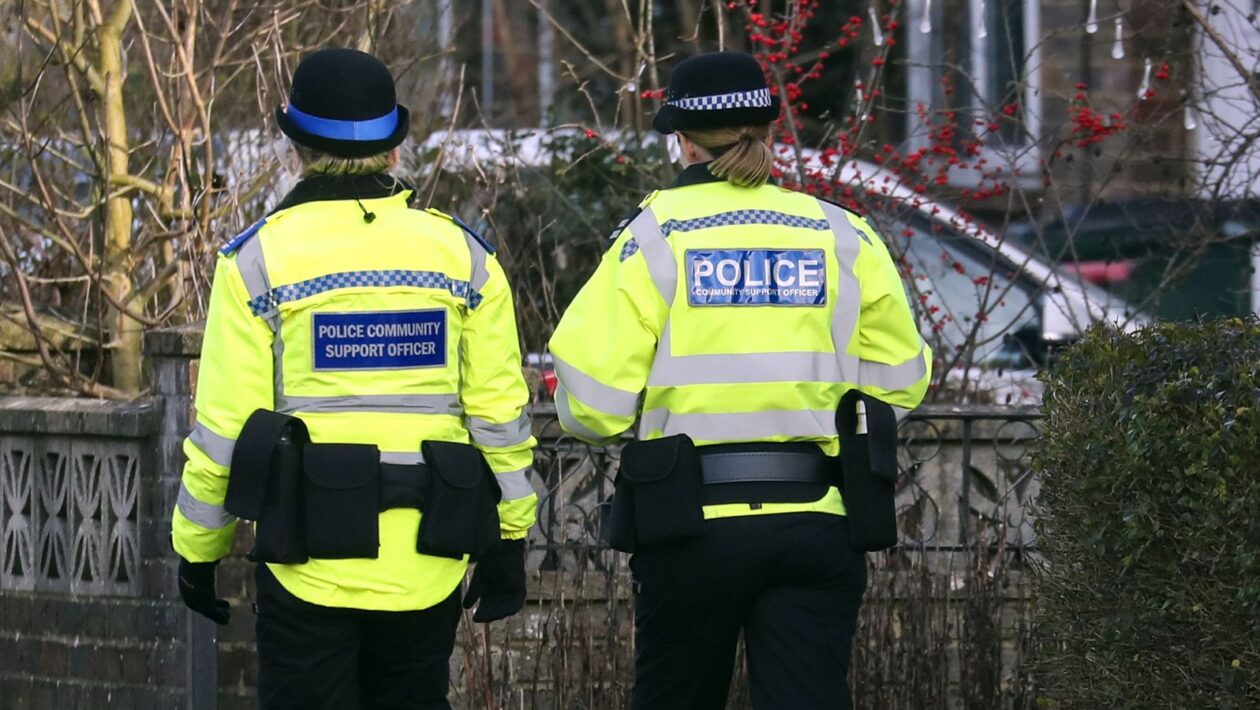[ad_1]

A new report on poor police vetting standards should be a “real wake-up call for chief constables across the country,” Transport Secretary Mark Harper has told Sky News.
His Majesty’s Inspectorate of Constabulary and Fire & Rescue Services (HMICFRS) has given details of a number of cases from between October 2018 and September 2021 to highlight problems with vetting systems.
These included cases where previous criminal behaviour was dismissed as a “one-off”.
Here are some examples that were highlighted by the watchdog.
Crimes as juveniles
One candidate applying to be a special constable cleared vetting despite having been put under a 12-month supervision order for indecent exposure as a juvenile.
HMICFRS discovered that he had exposed himself to the same woman seven times in a two-week period, each time standing at his bedroom window and coughing to attract her attention before masturbating.
The man applied three times to the same force over a 13-year period but was rejected, before appealing and being cleared, although inspectors said this should have been an automatic rejection.
Another said he had been cautioned for shoplifting as a juvenile, and as a teenager had been accused of rape. No measures were put in place to monitor him while working as a police officer to minimise risk.
Sex crime allegations
Another case involved a police officer “allegedly engaging in improper sexualised touching of a member of the public and junior officers”.
There were a number of complaints spanning several years and the claims, if proven, may have amounted to sexual assault. But none of the complainants would support action and the officer later transferred to another force which was made aware of the allegations and “other concerning information”.
They were granted vetting clearance by the chief constable who argued accepting the officer would “make the force more diverse”.
HMICFRS did not agree with the decision and found it ran the risk of “conveying the wrong message” to those who made the allegations.
One officer had been investigated five years earlier over a sexual assault at a nightclub.
Concerning and aggressive behaviour
One officer who transferred from a different force had been subject to 25 public complaints over 10 years, many of which were for “excessive use of force and incivility”. Four of the complaints resulted in “management action”.
The officer had also been arrested for being drunk and disorderly but no action was taken. There was no evidence the force considered the incidents as a “pattern of concerning behaviour”.
Two other cases highlighted were one involving a police community support officer (PCSO) who cleared vetting despite a previous caution for slapping his partner around the face seven years earlier, and one where an applicant for an officer post had robbed an 80-year-old woman as a juvenile nearly 20 years before.
Another police officer applicant who had accepted a caution for affray five years earlier was cleared when vetting officers wrongly concluded that he had not been aggressive when he and a friend punched and kicked a man.
Read more:
‘Thousands’ of corrupt officers may be in police after vetting failures, watchdog warns
Police forces ordered to reveal number of ‘intrusive’ child strip-searches
Criminal convictions or allegations
One police officer who had been caught speeding five years earlier had been convicted of attempted theft in another country, and there was intelligence possibly linking him to drug dealing and cars used by violent criminals.
The report also found that forces were not taking seriously enough cases where applicants had been arrested but not charged.
Candidates who cleared vetting included a police officer applicant who had a conviction for drink-driving and driving without insurance 18 years earlier, and four years after that was arrested for intimidating a witness, and twice after that for domestic assaults.
Another police officer candidate had been convicted of drink-driving and accepted a caution for theft from an employer more than 20 years before his application, then around 10 years after that had been investigated for racially aggravated criminal damage and public order, where the victim was an off-duty special constable.
A PCSO applying to become a police officer also wrongly cleared vetting after failing to declare a warning and penalty notice for cannabis possession.
Other examples
A number of cases were highlighted where concerns over family members were not properly dealt with.
One applicant to be a special officer had “extensive criminality” within his family, including a brother heavily involved in organised crime.
The sibling had convictions for violence and drug crime, was “of interest” in murder and kidnap investigations, and intelligence was held on him by several police forces in England and Wales.
Another community support officer applied to transfer to another force, but did not declare that he had been involved in a domestic incident where he hit his partner two years before becoming a PCSO. Various members of his family were also criminals.
However, vetting officers agreed it would be “harsh” to turn him down and that they would give him the benefit of the doubt.
[ad_2]

